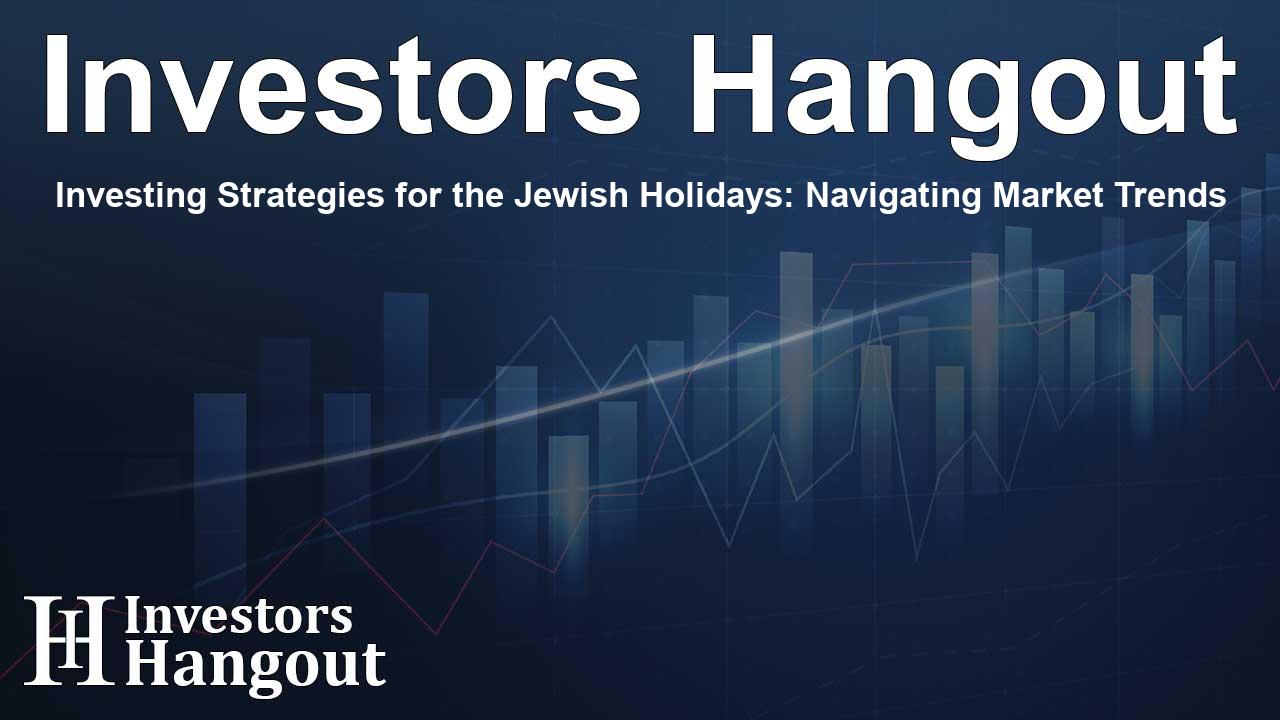Investing Strategies for the Jewish Holidays: Navigating Market Trends

Understanding Holiday Market Trends
The phrase "Sell Rosh Hashanah, Buy Yom Kippur" is an interesting adage referring to the secular market behavior around significant Jewish holidays. As these holidays approach, many investors reflect on potential trading strategies. As we approach the holidays, it’s important to dissect what this means in today’s investing climate.
Investing Insights from Recent Years
Following this strategy during 2023 would have proved rewarding for investors. After all, navigating the complexities of holiday trading patterns can lead to profitable outcomes. Looking back at previous cycles, market performance during this time has typically shown promise, indicating that historical trends can provide useful insights for current investment decisions.
The Historical Context
This market adage emerged from the understanding that those who observe these holidays seek to disconnect from material wealth. The days between Rosh Hashanah and Yom Kippur are often a time for introspection, evaluating one’s past actions, and preparing for the year ahead. It's a period ripe for emotional and strategic recalibration.
Market Performance: A Closer Look
No investment strategy guarantees success—market fluctuations often lead to a rollercoaster of results. In analyzing past performance, we note that while last year's returns were underwhelming post-holidays, this year brought a different story altogether. The influential S&P 500 index experienced growth, closing notably higher compared to where it started just before Rosh Hashanah. Notably, it reflects a robust increase seen earlier this year.
Future Considerations
With ongoing discussions from the Federal Reserve regarding inflation and interest rates shaping market sentiments, the question remains: how will these economic factors influence trading strategies moving forward? A possible easing on interest rates could foster growth in various sectors, benefiting companies that thrive with lower borrowing costs.
Assessing Your Investment Strategy
The directive of 'selling' your investments during these times varies significantly depending on individual financial goals. Young investors with long-term aspirations might consider staying the course—not reacting impulsively to short-term fluctuations can lead to more stable outcomes over time.
Evaluating Market Conditions
As markets experience the ebb and flow of economic data releases, investors should maintain a level head. Major indicators such as job statistics, and production and consumer price indexes will be influential. The recent rise in volatility due to geopolitical tensions may create moments of uncertainty, making it essential to remain mindful of both global and local economic climates.
Anticipating Earnings Reports
The upcoming earnings season, particularly the earnings report from a major financial institution, could provide significant insights into market trends. Observing these trends can guide your decisions, especially as they relate to potential earnings dynamics in the coming weeks.
A Roadmap for Investors
The fluctuations observed in the market during holiday seasons highlight the necessity for strategic planning. Understanding when to 'sell' and when to 'buy' requires careful consideration of long-term goals and avoiding rash emotional responses during market downturns. The dual nature of this adage teaches a valuable lesson about patience and preparedness in trading.
Frequently Asked Questions
What does the phrase 'Sell Rosh Hashanah, Buy Yom Kippur' mean?
This phrase refers to a trading strategy that suggests selling stocks before the Jewish holidays of Rosh Hashanah and buying back after Yom Kippur.
How have market performances changed during these holidays over the years?
Historically, market performances during these holidays have varied, but there have been significant upticks noticed in recent cycles that reward investors.
What economic indicators should investors watch for?
Key economic indicators to watch include job reports, consumer price indexes, and producer price indexes, which can impact market strategy.
How should young investors approach holiday trading?
Younger investors should aim for long-term gains, often making rash decisions during turbulent markets can lead to poor outcomes.
What impact does geopolitical tension have on market trends?
Geopolitical tensions can increase market volatility and uncertainty, influencing trading behavior as investors navigate these conditions.
About Investors Hangout
Investors Hangout is a leading online stock forum for financial discussion and learning, offering a wide range of free tools and resources. It draws in traders of all levels, who exchange market knowledge, investigate trading tactics, and keep an eye on industry developments in real time. Featuring financial articles, stock message boards, quotes, charts, company profiles, and live news updates. Through cooperative learning and a wealth of informational resources, it helps users from novices creating their first portfolios to experts honing their techniques. Join Investors Hangout today: https://investorshangout.com/
Disclaimer: The content of this article is solely for general informational purposes only; it does not represent legal, financial, or investment advice. Investors Hangout does not offer financial advice; the author is not a licensed financial advisor. Consult a qualified advisor before making any financial or investment decisions based on this article. The author's interpretation of publicly available data shapes the opinions presented here; as a result, they should not be taken as advice to purchase, sell, or hold any securities mentioned or any other investments. The author does not guarantee the accuracy, completeness, or timeliness of any material, providing it "as is." Information and market conditions may change; past performance is not indicative of future outcomes. If any of the material offered here is inaccurate, please contact us for corrections.